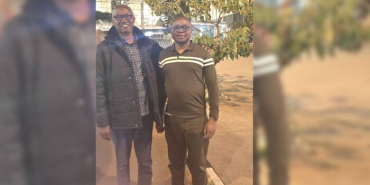Missile Strikes in Israel Disrupt Lives of Kenyan Nationals Living Abroad

Kenyan expatriates residing in Israel are confronting an increasingly volatile situation as tensions between Israel and Iran escalate, marked by recent missile strikes that have disrupted daily life and instilled a sense of uncertainty among the populace.
The immediate impact of these events has prompted emergency measures and heightened concerns within the Kenyan community, as individuals navigate the challenges of living in a conflict zone. Wanja Mwaura, a Kenyan citizen in Israel for medical treatment since October, experienced firsthand the abrupt shift in security. Initially anticipating a birthday celebration in Tel Aviv, her plans were upended by the initial missile attacks.
Mwaura describes the atmosphere as one of heightened fear, as residents grapple with the unpredictability of the situation. She notes the proximity of the strikes to her residence, with missiles impacting nearby apartment buildings and causing casualties. Israeli authorities have implemented a system of red alerts, delivered via mobile notifications, to warn residents of incoming attacks, compelling them to seek shelter in designated bunkers.
These alerts have become a frequent occurrence, disrupting daily routines and sleep patterns as individuals scramble to protected spaces. Mwaura emphasises the intensity of the situation, describing the loud blasts and the pervasive uncertainty gripping the city. Tel Aviv, like other Israeli cities, is equipped with underground bunkers designed to provide civilians with protection during wartime. Mwaura's neighbourhood features strategically located shelters, offering some reassurance amidst the ongoing conflict.
Her husband, Martin Machuki, initially perceived their stay in Israel as safe, but the missile strikes shattered that sense of security. While acknowledging the national security threat, Machuki emphasises the effectiveness of the safety measures in place, particularly the designated safe houses. He identifies falling debris from intercepted missiles as the primary immediate danger.
Mwaura previously garnered attention in Kenya for her humanitarian work, reuniting with a former classmate struggling with drug addiction. Her efforts through the Wanja Mwaura Foundation aided in his rehabilitation, although he later passed away. Now, Mwaura faces a different set of challenges as she navigates the realities of living through a military conflict abroad.
Her planned return to Kenya has been disrupted by the ongoing hostilities. Originally scheduled to depart next month upon completing treatment, she now finds herself stranded due to the closure of Israeli airspace for security reasons. While she desires an immediate return, travel restrictions offer no immediate solution.
Despite the turmoil, Mwaura finds support within the close-knit Kenyan community in Israel. She emphasises the community's proactive assistance, ensuring she has accommodation and covering daily expenses. However, the missile strikes have fundamentally altered life, replacing stability with fear.
The Israeli government has enacted strict emergency measures nationwide, including bans on educational activities, public gatherings, and non-essential workplace operations, as the military prioritises homeland defence. Civilian life remains disrupted on multiple fronts as airstrikes continue. Kenyan residents in Israel maintain communication through support groups, sharing concerns and updates.
According to Martin Muchiri, chairperson of the Kenyan expatriate community in Israel, no Kenyan casualties have been reported. He highlights the existence of support groups where individuals can share grievances and challenges, with the community striving to provide solutions. Having resided in Israel since 2020, Muchiri notes that while he has witnessed previous security incidents, the recent events are uniquely distressing.
Muchiri describes the loud blasts and the anxiety experienced while in bunkers, noting the particular impact on children, many of whom exhibit signs of trauma in response to the attacks. He commends the Kenyan embassy in Israel for its role in keeping expatriates informed and providing assistance. As the crisis continues, Kenyan nationals in Israel rely on community support and government updates, hoping for stability in the coming days.








Add new comment